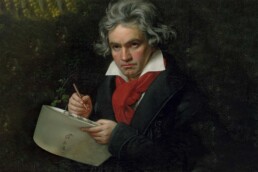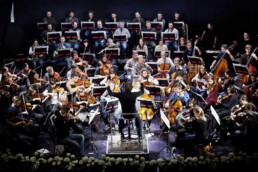Beethoven's Symphony of Joy
The beautiful hills of Bonn, Germany, witnessed the development of one of history’s most transformative composers in 1770. A child prodigy, born to a court musician father, began his path in a chaotic environment, rather than with privilege. From a young age, this youngster was motivated by music, sculpted by hard discipline and a desire to transcend the ordinary.
The latter half of the eighteenth century was a period of colossal upheaval. Enlightenment ideals collided with existing regimes, resulting in uprisings across Europe. Against this setting, a young composer immersed himself in the Classical traditions established by Haydn and Mozart. Nonetheless, even in his early years, whispers of an unbreakable spirit and revolutionary flair distinguished him. This was no ordinary imitator; this was an artist destined to push the frontiers of music itself.
In an era ripe for revolution, grand symphonies, intimate sonatas, and ground-breaking concertos emerged. His Third Symphony, *Eroica*, originally dedicated to Napoleon Bonaparte, defied expectations with its audacious length and emotional depth. The Fifth Symphony, with its signature “fate knocking at the door” motif, is still one of the most recognised works in Western music. Piano sonatas such as the *Moonlight Sonata* and *Pathétique* demonstrate the depth of his contemplative brilliance.
Perhaps his best effort, the Ninth Symphony, concludes with the *Ode to Joy*, a choral climax that depicts global brotherhood—a feeling that continues to reverberate today. Such masterpieces were more than just compositions; they were expressions of human perseverance and transcendence.
Few incidents in the history of art are more heartbreaking and uplifting than the loss of a master composer’s hearing. Deafness began as a minor condition in his late twenties and gradually worsened, sinking him into despair. The renowned *Heiligenstadt Testament*, a letter he penned but never mailed, depicts his internal struggle: on the verge of death, he decided to live for his work. Against all odds, his disability fuelled his creativity rather than hindering it. During this period of intense quiet, Beethoven composed some of his most famous compositions, including the Ninth Symphony.
While widely honoured, his life was not without controversy. His volatile disposition, described by contemporaries as unpleasant and erratic, alienated many of those around him. Legal fights over custody of his nephew Karl revealed a very flawed but human side, characterised by possessiveness and domineering tendencies. Even romantic endeavours were plagued with heartbreak. The mystery of the “Immortal Beloved,” an unidentified character referenced in a passionate letter, continues to fascinate academics and fans.
Critics of his period were frequently divided, with some praising his creativity and others dismissing his drastic departures from norm. However, history has been clear in its assessment. His works provided the groundwork for the Romantic era, influencing figures such as Brahms, Wagner, and others.
The premiere of the Ninth Symphony in 1824 was one of the most melancholy occasions of his life. Unable to hear the thunderous clapping, he reportedly turned around to see the audience’s overwhelming adulation. This one event represents not just creative accomplishment, but also human tenacity in the face of enormous circumstances.Another defining event was his funeral in 1827. Over 20,000 people packed the streets of Vienna to say goodbye, demonstrating his great influence on his contemporaries and the musical world.
His works continue to have a profound impact across genres, civilisations, and centuries. His compositions have appeared in a variety of settings, including grand orchestral concerts, film scores, advertisements, and pop music. The *Ode to Joy* serves as the European Union’s anthem, representing ideals of unity and peace.
Modern interpretations of his life and work continue to flourish, ranging from biographies and films to academic research that reveals new insights into his creative processes. For many, his life story exemplifies the limitless potential of human ingenuity, especially in the face of tragedy.
The capacity to connect across time is what distinguishes a genius, and this composer’s music does just that. His compositions encourage listeners to go into the depths of emotion, the heights of human aspiration, and the beauty of artistic inventiveness. In an ever-changing world, his music serves as a constant, a bridge to the sublime that reminds us of our common humanity.


